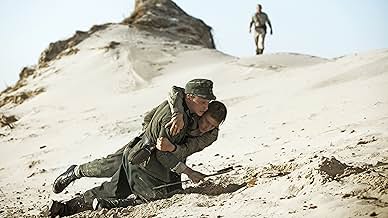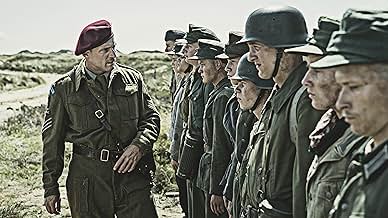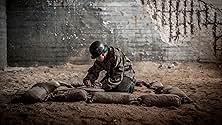VALUTAZIONE IMDb
7,8/10
47.995
LA TUA VALUTAZIONE
Nella Danimarca del secondo dopoguerra, un gruppo di giovani prigionieri di guerra tedeschi sono costretti a ripulire una spiaggia di migliaia di mine antiuomo.Nella Danimarca del secondo dopoguerra, un gruppo di giovani prigionieri di guerra tedeschi sono costretti a ripulire una spiaggia di migliaia di mine antiuomo.Nella Danimarca del secondo dopoguerra, un gruppo di giovani prigionieri di guerra tedeschi sono costretti a ripulire una spiaggia di migliaia di mine antiuomo.
- Candidato a 1 Oscar
- 33 vittorie e 27 candidature totali
Zoe Zandvliet
- Elisabeth, Karins Daughter
- (as Zoé Zandvliet)
Max Beck
- August Kluger
- (as Maximilian Beck)
Recensioni in evidenza
This movie certainly deserved its Oscar nomination.
Rarely do movie stick with me for days. 'Land of mine' did.
It's not an action-movie, like 'Dunkirk' or other movies set in and around World War 2. It's an important character study about humanity, desperation, resentment, anger, prejudice and hate that I think everyone need to see, even if they have no interest in World War 2. There are no good or bad guys here. Just people that try to deal with difficult situations commanded by other people above them.
They should make more movies like this.
Rarely do movie stick with me for days. 'Land of mine' did.
It's not an action-movie, like 'Dunkirk' or other movies set in and around World War 2. It's an important character study about humanity, desperation, resentment, anger, prejudice and hate that I think everyone need to see, even if they have no interest in World War 2. There are no good or bad guys here. Just people that try to deal with difficult situations commanded by other people above them.
They should make more movies like this.
This unbearably tense war movie is the Danish entry for this year's Best Foreign Language film. It's about a group of young German POW's who are forced to clear a minefield with their bare hands and it makes "The Hurt Locker" seem like a walk in the park. Brilliantly directed by Martin Zandvleit and beautifully played by a cast of mostly unfamiliar faces, this is an intelligent and unsentimental look a a piece of World War Two history usually ignored by the cinema and it has the courage to paint 'the enemy' in a good light and 'the allies' as villains. It's also beautifully shot in widescreen by Camilla Hjelm. See this.
In matters of war, no nation is free of guilt. Regardless of whether they are produced by victorious or vanquished countries, the better war films set out facts, acknowledge wrongdoing, express regret, and seek atonement. Many of them put guilt and culpability onto the widescreen so that current and future generations may learn from the past. This is the psychological space in which we find the extraordinary Danish-German war film Land of Mine (2016).
It is 1945 and the war is over, but the beautiful Danish coastline has two million deadly mines left buried in the sand by the Nazi occupation. Danish Sergeant Carl Rasmussen (Roland Møller) is assigned a squad of fourteen German prisoners of war who must clear a beach that contains 45,000 active mines. The Sergeant's treatment of the teenage boys is initially brutal: they live and work in terrible conditions, are practically starved and constantly reminded that everyone in Denmark hates them and nobody cares if they live or die. Their task is to crawl along the beach by hand, poking a stick in the sand to locate mines, then defuse them before they explode. Inevitably, many failed. With echoes of Stockholm syndrome, both captor and captives find glimpses of humanity in each other that leads to Rasmussen being suspected by his tormenting superiors of going soft on the Germans. He must walk the fine line between military obedience, personal hatred of Nazis, and his growing compassion and realisation that these are just boys who were conscripted into battle. His characterisation and its transition from hatred to acceptance frames the narrative of this high-tension drama.
Stunningly realistic cinematography with minute attention to detail amplifies the horror of this story. The acting is remarkable from a mostly unknown cast and Rasmussen's performance captures the very essence of moral conflict. The mine-clearing proceeds inch-by-agonising-inch, and the film's plot line inches forward at a similar pace. With camera at sand-level, we see close-up images of teenage warriors with beads of terror trickling down their faces as their sand-covered fingers slowly un-screw a detonator from a mine, knowing that an explosion will tear their body to pieces. These are some of the most heart-pulse racing moments you can experience through film. This is not entertainment nor is it for faint-hearted viewers; several scenes are horrific.
Most war films glorify battle or corner us into cheering one side or the other. This film presents an exquisite conundrum: was it morally acceptable for the Danish military to force German POWs to remove the deadly mines that the Nazi army left behind, knowing that most will die or be maimed? Or should this deadly work have been carried out by Danish soldiers? Was the inhumane treatment of teenage soldiers justifiable, regardless of the brutality of the Nazi occupation of Denmark? In the light of such questions, is this film one of justification or a confessional that seeks atonement? Land of Mine shines a bright light on what has hitherto been a dark secret of Danish history. It is a powerful and important story.
It is 1945 and the war is over, but the beautiful Danish coastline has two million deadly mines left buried in the sand by the Nazi occupation. Danish Sergeant Carl Rasmussen (Roland Møller) is assigned a squad of fourteen German prisoners of war who must clear a beach that contains 45,000 active mines. The Sergeant's treatment of the teenage boys is initially brutal: they live and work in terrible conditions, are practically starved and constantly reminded that everyone in Denmark hates them and nobody cares if they live or die. Their task is to crawl along the beach by hand, poking a stick in the sand to locate mines, then defuse them before they explode. Inevitably, many failed. With echoes of Stockholm syndrome, both captor and captives find glimpses of humanity in each other that leads to Rasmussen being suspected by his tormenting superiors of going soft on the Germans. He must walk the fine line between military obedience, personal hatred of Nazis, and his growing compassion and realisation that these are just boys who were conscripted into battle. His characterisation and its transition from hatred to acceptance frames the narrative of this high-tension drama.
Stunningly realistic cinematography with minute attention to detail amplifies the horror of this story. The acting is remarkable from a mostly unknown cast and Rasmussen's performance captures the very essence of moral conflict. The mine-clearing proceeds inch-by-agonising-inch, and the film's plot line inches forward at a similar pace. With camera at sand-level, we see close-up images of teenage warriors with beads of terror trickling down their faces as their sand-covered fingers slowly un-screw a detonator from a mine, knowing that an explosion will tear their body to pieces. These are some of the most heart-pulse racing moments you can experience through film. This is not entertainment nor is it for faint-hearted viewers; several scenes are horrific.
Most war films glorify battle or corner us into cheering one side or the other. This film presents an exquisite conundrum: was it morally acceptable for the Danish military to force German POWs to remove the deadly mines that the Nazi army left behind, knowing that most will die or be maimed? Or should this deadly work have been carried out by Danish soldiers? Was the inhumane treatment of teenage soldiers justifiable, regardless of the brutality of the Nazi occupation of Denmark? In the light of such questions, is this film one of justification or a confessional that seeks atonement? Land of Mine shines a bright light on what has hitherto been a dark secret of Danish history. It is a powerful and important story.
"Those of you who count the mines, make sure my card is updated. This task is as important as defusing mines." Sgt. Carl Rasmussen (Roland Moller)
In 1945, Denmark needed to defuse the over 2 million landmines left on their western beaches by the Nazis. A Danish sergeant is responsible for 14 German POWs, youngsters all, to find the 45 K on one beach, after which the boys can go home.
That precision mentioned in the opening quote lies at the heart of the film's considerable suspense because one unaccounted for mine can take multiple lives. And so, the sergeant has to corral teenage workers, motivate them with fear, and keep at bay his growing affection for them.
Therein lies the real suspense: Will he learn to love and protect them or will he be brutal as he was in the opening scene? For a story somewhat like Hurt Locker, Land of Mine is a minimalist work of complexity, unadorned with the usual tropes of thrillers but full of the humanity to make it rise above just another WW II sentimental reflection.
Besides the tension built into the always impending explosions is the question of whether or not the Danes will act like Nazis suppressing the lads and hurrying them on to death. The moments of warmth between the sergeant and the boys are few but revelatory enough for us to hope their innocence and bravery will win him over.
Land of Mine will usher you into a war zone you've not seen handled so well in cinema, except possibly Jean Renoir's Grand Illusion in the '30's. The drama, replete with many dramatic elements and even Chekov's gun, will make you wince at the possibly grotesque fate of faultless boys and their conflicted sergeant.
In 1945, Denmark needed to defuse the over 2 million landmines left on their western beaches by the Nazis. A Danish sergeant is responsible for 14 German POWs, youngsters all, to find the 45 K on one beach, after which the boys can go home.
That precision mentioned in the opening quote lies at the heart of the film's considerable suspense because one unaccounted for mine can take multiple lives. And so, the sergeant has to corral teenage workers, motivate them with fear, and keep at bay his growing affection for them.
Therein lies the real suspense: Will he learn to love and protect them or will he be brutal as he was in the opening scene? For a story somewhat like Hurt Locker, Land of Mine is a minimalist work of complexity, unadorned with the usual tropes of thrillers but full of the humanity to make it rise above just another WW II sentimental reflection.
Besides the tension built into the always impending explosions is the question of whether or not the Danes will act like Nazis suppressing the lads and hurrying them on to death. The moments of warmth between the sergeant and the boys are few but revelatory enough for us to hope their innocence and bravery will win him over.
Land of Mine will usher you into a war zone you've not seen handled so well in cinema, except possibly Jean Renoir's Grand Illusion in the '30's. The drama, replete with many dramatic elements and even Chekov's gun, will make you wince at the possibly grotesque fate of faultless boys and their conflicted sergeant.
Nominated for Best Foreign Language Film at the upcoming Academy Awards, Land of Mine (also known as Under sandet) is a disturbing, disquieting & devastating cinema that's inspired from the immoral & inhuman act that the Danish authorities perpetrated against German POWs, majority of whom were teenagers, following the end of the Second World War in Europe.
Set in post-World War II Denmark, the story of Land of Mine follows a Danish Sergeant who is assigned the duty to defuse & remove over 2 million mines that were buried by the Germans along the coast during the war. Receiving a batch of teenage Germans POWs to carry out the operation, the Sergeant's initial hostility towards them begins to undergo an unexpected change.
Written & directed by Martin Zandvliet, the film opens with a crucial sequence that establishes the seething hatred that the Sergeant has against Germans and takes it up from there. Every segment featuring the young boys trying to defuse the mines with their bare hands despite being obviously ill-equipped to carry out the dangerous task is nail-biting as hell and even more hard-hitting when they fail at it.
Zandvliet's direction exhibits terrific restraint from start to finish and even more admirable is how he handles the characters & their arcs. Without choosing a side, he puts believable people on screen and keeps all their human attributes in tact, whether they are Danish or Germans. And while the hostile nature of the former against the latter is understandable, what the Danish authorities force them to do is equally inexcusable.
Shot at historically authentic locations, the entire picture is splendidly photographed and the era of Denmark recovering from the war is wonderfully captured by its desaturated & earthy colour tones. Camera-work is hand-held, static & expertly controlled for the most part and allows the scenes to play out at their desired pace but the longer it lingers on the defusing process, the more suspenseful it becomes and majority of the time, ends on a heartbreaking note.
Editing is skilfully carried out, for every single minute of its 1½ hour narrative is accounted for & is relevant to the plot. Every sequence on the beach is compelling & handled with patience and every explosion or casualty reverberates with the audience & the impact of it is deeply felt. The film does feel longer than its runtime but it is relentlessly gripping till the end. And further enhancing its grim aura is the poignant score that always surfaces on time.
Coming to the performances, Land of Mine features an incredibly committed cast in Roland Møller, Louis Hofmann & others, with Hofmann impressing the most. Møller is in as the Sergeant overseeing the mine clearing operation and expresses his character's inner conflict brilliantly while Hofmann plays one of the young boys performing the fatal, endless task of defusing millions of buried mines with stunning balance, and the scenes between the two are its main highlight.
On an overall scale, Land of Mine not only ranks amongst the best films of its year but is one of the finest films to come out from Cinema of Denmark. Incessantly human, powerfully moving & making a strong statement about what makes us human & why it's even more important to stay as one in times of bitter conflict, this Danish masterpiece is an extremely riveting example of its genre that treads a difficult path & is utterly discomforting at times yet manages to fully redeem itself in the end. An essential viewing by all means, this Danish masterpiece comes very highly recommended.
Set in post-World War II Denmark, the story of Land of Mine follows a Danish Sergeant who is assigned the duty to defuse & remove over 2 million mines that were buried by the Germans along the coast during the war. Receiving a batch of teenage Germans POWs to carry out the operation, the Sergeant's initial hostility towards them begins to undergo an unexpected change.
Written & directed by Martin Zandvliet, the film opens with a crucial sequence that establishes the seething hatred that the Sergeant has against Germans and takes it up from there. Every segment featuring the young boys trying to defuse the mines with their bare hands despite being obviously ill-equipped to carry out the dangerous task is nail-biting as hell and even more hard-hitting when they fail at it.
Zandvliet's direction exhibits terrific restraint from start to finish and even more admirable is how he handles the characters & their arcs. Without choosing a side, he puts believable people on screen and keeps all their human attributes in tact, whether they are Danish or Germans. And while the hostile nature of the former against the latter is understandable, what the Danish authorities force them to do is equally inexcusable.
Shot at historically authentic locations, the entire picture is splendidly photographed and the era of Denmark recovering from the war is wonderfully captured by its desaturated & earthy colour tones. Camera-work is hand-held, static & expertly controlled for the most part and allows the scenes to play out at their desired pace but the longer it lingers on the defusing process, the more suspenseful it becomes and majority of the time, ends on a heartbreaking note.
Editing is skilfully carried out, for every single minute of its 1½ hour narrative is accounted for & is relevant to the plot. Every sequence on the beach is compelling & handled with patience and every explosion or casualty reverberates with the audience & the impact of it is deeply felt. The film does feel longer than its runtime but it is relentlessly gripping till the end. And further enhancing its grim aura is the poignant score that always surfaces on time.
Coming to the performances, Land of Mine features an incredibly committed cast in Roland Møller, Louis Hofmann & others, with Hofmann impressing the most. Møller is in as the Sergeant overseeing the mine clearing operation and expresses his character's inner conflict brilliantly while Hofmann plays one of the young boys performing the fatal, endless task of defusing millions of buried mines with stunning balance, and the scenes between the two are its main highlight.
On an overall scale, Land of Mine not only ranks amongst the best films of its year but is one of the finest films to come out from Cinema of Denmark. Incessantly human, powerfully moving & making a strong statement about what makes us human & why it's even more important to stay as one in times of bitter conflict, this Danish masterpiece is an extremely riveting example of its genre that treads a difficult path & is utterly discomforting at times yet manages to fully redeem itself in the end. An essential viewing by all means, this Danish masterpiece comes very highly recommended.
Lo sapevi?
- QuizThe actors were trained in mine clearance 'anno 1945' at the Military Training Compound 'Oksbøl.' During training, they found a 'live' mine that had been there for 70+ years--and it was in fine working condition. The mine was removed and disarmed by the Danish de-mining experts.
- BlooperThey are mainly clearing Anti-Tank mines, and indeed mention this in the dialogue. However, Anti-Tank mines are designed to not be triggered by a person's weight, so troops can cross them without them going off--so that they are still in place and active when armored vehicles in support of the troops ultimately cross the same path as the troops. Anti-Tank mines need several tons of pressure to activate. In the film, they are treated like eggshells.
- Citazioni
Lt. Ebbe Jensen: If they are old enough to go to war, they are old enough to clean up.
- ConnessioniFeatured in La noche de...: La noche de... Bajo la arena (2021)
I più visti
Accedi per valutare e creare un elenco di titoli salvati per ottenere consigli personalizzati
- How long is Land of Mine?Powered by Alexa
Dettagli
- Data di uscita
- Paesi di origine
- Siti ufficiali
- Lingue
- Celebre anche come
- Land of Mine
- Luoghi delle riprese
- Aziende produttrici
- Vedi altri crediti dell’azienda su IMDbPro
Botteghino
- Budget
- 35.500.000 DKK (previsto)
- Lordo Stati Uniti e Canada
- 435.266 USD
- Lordo in tutto il mondo
- 3.169.553 USD
Contribuisci a questa pagina
Suggerisci una modifica o aggiungi i contenuti mancanti

Divario superiore
By what name was Land of Mine - Sotto la sabbia (2015) officially released in India in Hindi?
Rispondi



















